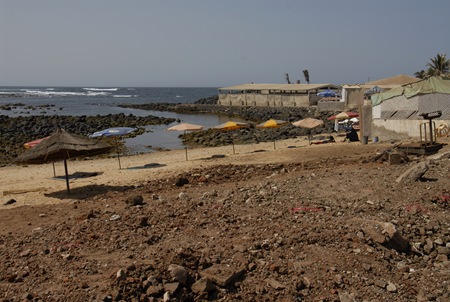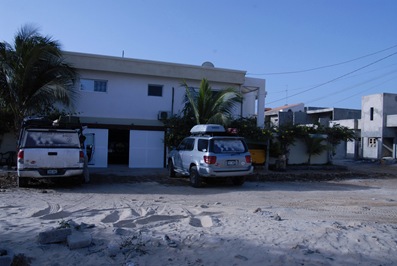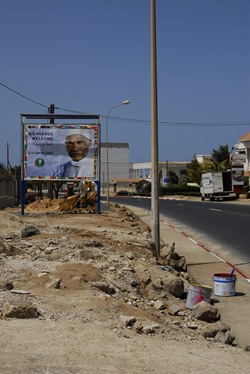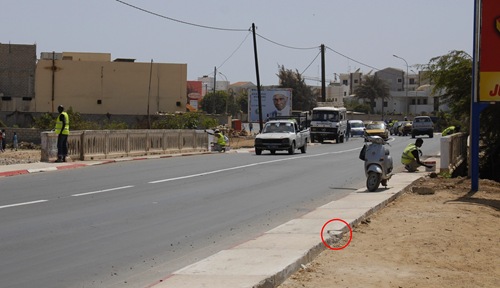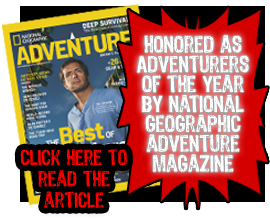Over a week ago now was the beginning of the action packed speed run through Niger, Nigeria, Cameroon and then further down the coast of the West coast of Africa. The Thundra and Little Pepe are now safely resting in the courtyard of the Botanic Gardens Guesthouse here in Limbe, Cameroon. The crew and the trucks well deserved break in this beautiful garden on the beach came just in time as all of our patience and sanity was truly running thin.
On Thursday, April 27th, we left Ouagadougou, Burkina Faso in the early evening. We drove into the night and found a campsite off the highway around midnight. Over the radio I heard Steve Bouey ask, “How much longer do you want to drive?” Moments before that I was thinking, either we drive until midnight or until the temperature drops below 85 degrees. They both happened at about the same time. Due to our money constraints these days, we camp the majority of the time to save money. However, since the temperature is generally well above 100 degrees even after dark sleeping or for that matter, sitting, is not really an option.
We went to sleep shortly after arriving, but sleep we did not get. About an hour after the lights were turned out, a herd of donkeys, or group or gang, was prowling around the field we decided to stay in. Donkeys generally seem like fairly benign animals, just towing carts around and doing their stubborn thing. The reality is much different. These characters make the most ridiculous eeeeeehhh-haaaaaaaw noises you have ever heard, and they carry on all night long. Not just the occasional I am a stubborn donkey eehh-haaw…these guys get after it. Long drawn out wails that sound horrible, even painful. We have never really been able to pinpoint what compels these noisemakers to get with it, but they do it in packs, they do it alone, they do it whenever they damn well please, they are donkeys (asses). This donkey gang was charging each other, running back and forth, and at points even charging toward the tents.
The next morning came around and we were greeted by the usual group of the local curious children from the nearby village. At about 6:30 they were crouching around the tents. They mean no harm, but the whispers and crackling of branches under their feet is enough to put a halt to any leisurely get out of bed slowly morning. We were packed and on the road quickly and made it to the border before noon. Burkina Faso into Niger was extremely easy, so we were able to make it to Naimey, the capital, by the early afternoon. There we got some more money and gas to carry on to the Nigeria border. Again we carried on until it started to cool down and camped in a dry riverbed. Since we had made it back into the Sahara for the 3rd time since we have entered Africa, the cool desert nights made for some decent sleeping.
 Again the next morning the local kids were there as our alarm clock, appropriately on Camels since we were in the Sahara. After giving them a little food for breakfast we took a couple of photos and raced to the Nigerian border. No problems, contrary to our preconceived notions of Nigerian corruption, the border was one the most pleasant yet. We figured that we would be near Abuja, the capital by the evening…wishful thinking only goes so far in Africa. I grabbed a handful of Euros from Bouey and exchanged them on the black market only to find out that the exchange rate was nearly double what we expected, making gas and expenses much cheaper. That was only until we made it to the other side of town to the gas MegaStation with 30 or so pumps. The only thing it was lacking was gas to pump. After talking to a couple of locals in the line wrapping around the gas station and about a mile down the road we were told, “Gas is not coming until tomorrow, your only option is to buy gas on the black market.”
Again the next morning the local kids were there as our alarm clock, appropriately on Camels since we were in the Sahara. After giving them a little food for breakfast we took a couple of photos and raced to the Nigerian border. No problems, contrary to our preconceived notions of Nigerian corruption, the border was one the most pleasant yet. We figured that we would be near Abuja, the capital by the evening…wishful thinking only goes so far in Africa. I grabbed a handful of Euros from Bouey and exchanged them on the black market only to find out that the exchange rate was nearly double what we expected, making gas and expenses much cheaper. That was only until we made it to the other side of town to the gas MegaStation with 30 or so pumps. The only thing it was lacking was gas to pump. After talking to a couple of locals in the line wrapping around the gas station and about a mile down the road we were told, “Gas is not coming until tomorrow, your only option is to buy gas on the black market.”
At that moment it came clear to me why a crazy Nigerian man ran across the street toward our trucks with an old beat up one gallon plastic oil container full of gas. He was the king of the gasoline black market. Within two minutes of pulling over to the side of the road, at least 7 or 8 gas vendors were swarming us, along with an audience admiring the trucks and I suppose us as we were quite out of place in this small town in the middle of nowhere Nigeria. A police officer with a beret and bloodshot eyes from too much of whatever is part of his afternoon routine joined the gas festival. At first we thought he was going to shut down this illegal marketplace, but he was much too stoned to do that and besides it was a chance for him to make a little money as well. Soon all of the gas vendors were in argument as to who found our gas guzzling trucks first.  The argument was getting so heated at one point that we were about to just get in the trucks and leave before a fight broke out. Moments later they calmed things down and decided to split the 10 gallon purchase between two of the vendors. Our hope was to buy just enough of the double priced gas to get us to a real gas station in the next big town.
The argument was getting so heated at one point that we were about to just get in the trucks and leave before a fight broke out. Moments later they calmed things down and decided to split the 10 gallon purchase between two of the vendors. Our hope was to buy just enough of the double priced gas to get us to a real gas station in the next big town.
Abuja was a dream long gone at this point, but we were hoping to at least make it to the next town to get gas before dark. After passing 6 or so small towns on the way to Gasau, well over 10 gas stations were dry, including Gasau. What could be the problem, we thought. We filled up with some more black market gas and pushed on hoping to get out of the city and setup camp. I radioed to Bouey, “Does it look like there should be somewhere to camp soon?”
“There are no towns on the map between here and Zaria.”
It was true, no towns between there and Zaria, but villages would make an appearance every 10 km or so. After driving for a couple of hours, the group decision was to just pull off the side of the road and sleep in the cars until light. Nigerian drivers are out of their mind and from the number of wrecks on the sides of the highway, it is easy to see that driving at night is a horrible idea. Moments after we got somewhat situated next to the road a truck full of men pulled up. Four to five men were sitting in the bed of the beaten up early 90s Toyota. They jumped out of the back of the truck with AK-47s in hand and approached us with a small flashlight. Looking back I wonder why I had no fear as we were in a country full of rebels and  bandits, or so we had heard. “Hello?” said one of the men. We responded, “Hello??” As they approached their silhouettes became more apparent, they were wearing berets and uniforms, they were the police. In Nigeria, they speak English a little bit differently and instead are called the Crime Patrol. It was hand painted crooked on the side of the pickup in a highly official manner with red paint and the last letters squeezed in as the artisan in charge of labeling the vehicles must not have been an ace in spacing and typography.
bandits, or so we had heard. “Hello?” said one of the men. We responded, “Hello??” As they approached their silhouettes became more apparent, they were wearing berets and uniforms, they were the police. In Nigeria, they speak English a little bit differently and instead are called the Crime Patrol. It was hand painted crooked on the side of the pickup in a highly official manner with red paint and the last letters squeezed in as the artisan in charge of labeling the vehicles must not have been an ace in spacing and typography.
They invited us to sleep in front of the crime patrol station and assured us that we would be safe there as they would be patrolling back and forth all night long and keep an eye on us. That morning I woke up at about 6 am and looked over at the station to see that the person in charge of car labels had also been commissioned to label the crime patrol station. The outward appearance of the station led me to believe this would not be the place to file a report if something bad was to happen.

The next morning we finally found a gas station that had gas at the pump at the nice low price of about $.60 per liter or $2.20 per gallon. To prevent any more hold ups with the black market gas we filled up every last jerry can full of fuel. While Mark and Bouey worked on filling and securing the cans to the truck, I went with another man to exchange some more Euros in order to pay for our 400 liters of gas. As with anywhere in Nigeria, there is always someone who knows someone who can exchange money. The other option is to go to the bank, but that is a little hard considering that I passed 4 banks on the way to change money in a back alley, all of which were closed and had been for some time. Standardized systems are not exactly the Nigerians strong suit.
That evening we drove as far as we could before dark and ended up in a town called Gboko. At a gas station with a horribly unkept hotel in back we scrambled to figure out how we were going to find a decent place to stay that night. A young man named AOJ approached us and asked, “Is this hotel not pretty enough for you guys?”
We replied, “It is fine but we cannot find anyone to help us.”
“I can show you some hotels in town that are much nicer with a place to park the trucks.”
AOJ jumped in the truck with me and we made our way towards the hotel that he thought would suit us. I radioed back to the Thundra, “We have to take a detour as the road is under construction.”
Immediately AOJ turned to me and said, “Can I talk to them on that thing!?”
“Of, Course.”
AOJ then full of excitement yells into the microphone, “Steve, Steve!!!”
He was so over zealous that he did not realize pushing the button on the side of the mic is how the system works. Since it was dark and there were no time for radio lessons, I had to reclaim the mic until we reached the hotel. We went down one detour…it did not go through, down another…it did not go through. About 30 minutes later we had finally reached the hotel. I gave AOJ a few dollars for his trouble, which he did not even expect…he was doing it just because he was a good guy. And most likely because he was a Christian, as he asked me upfront if I was. The missionaries have a very strong presence down here. He asked if he could come meet us in the morning before we left and inquired how it might be possible for him to join the crew. We told him that we could talk more about it in the morning as we were exhausted from the already 14 hour day.
Bright and early, on time, AOJ was in the hotel lobby and although we wanted to sleep in, as usual Africa will not let us. The front desk called to alert us to AOJ’s arrival. We took showers and made our way out to get breakfast, AOJ had already left. After gassing up the cars we were on our way out too, but there he was, AOJ on the back of his friend’s moto waving and yelling.
“Hey guys, hey guys!”
AOJ only speaks with full excitement. “I thought I had missed you, but I wanted a photo.”
His friend had an old film camera and snapped a couple of shots.

We made it into Calabar that afternoon and were setup for free at a hotel called the Zoo Garden. We gave our usual pitch to the owner, but he did not seem to care as the hotel was under renovation. Mark and I went on and on about how we can benefit him by directing other overlanders to his hotel as they check out our website. He interrupted and said sure we will accommodate you. I think he was just sick of listening to us. Calabar and the rest of Nigeria is notorious for power outages, so we went much of the stay without lights or fans, but that is nothing new here in the 100 degree, 100% humidity heat of Africa. With relative ease other than power outages making photocopies hard to get, we had our Cameroon visas and were on our way in a matter of two days. With only 500kms to go we were in sight of a tourist oasis for a little R&R from the rigors of Africa. Limbe was a day’s drive away, or so we thought.
As we neared the Nigeria-Cameroon border the immigration police stopped us to check our documents. “You have overstayed your visas,” said the policeman.
“This is not possible, we have three month visas.”
“At the border they have the ability to change the validity of your visa by putting a different date on the stamp.”
This was news to us. Not over the course of 50 countries have we encountered anything like this. A visa has the validity on it, not on the stamp. The guards on the other side were so nice, but ultimately did not know what they were doing as they also used a Nigerian resident stamp to stamp our passports. The guards let us through, but informed us that we may have troubles at the actual border. With no choice but to push forward, we took our chances.
At the next stop we had our first real dose of Nigerian corruption. The border guards led us to believe that they were the immigration checkpoint, when in fact they were not. They again told us that we had overstayed our visas and would have to drive back to Calabar to fix the problem. After two hours of negotiations and many attempts from these guys to get $300 US dollars out of us, we got the best of them. Mark started talking about corruption and then I went on to patriotism saying:
“You know how Nigeria has a bad reputation for rebels and corruption and crime. The men at the other border clearly made a mistake and as a Nigerian citizen who is educated and clearly more intelligent than the other guards, you have an opportunity to make up where your other citizens are lacking. We write stories about all of the countries we visit and you have a choice right now, do you want to give Nigeria a good name or a bad name?”
Mark through in some words about the golden rule and next thing you know the border guards let us through, escorted us to the actual immigration house and made sure that we would not have any more problems with this mistake. In fact, they even gave us lunch and cold filtered water to drink. We gave the two corrupt border guards TWBR t-shirts, and although they do not deserve them, we will always know that those are their TWBR diplomas, as April 2nd, 2008 they graduated our school on how to fail at extorting money off the fine expedition crew of The World by Road.
Now, with 80kms to go before the first town in Cameroon, 2 hours left of daylight and an unpaved road notorious for being bad, the day had really just begun. The Cameroon border process went quickly and easily with a notation from the last checkpoint, “The road is a little muddy right now, but you have strong cars so you should be fine.” A little mud is no match for Thundra and Little Pepe…I will leave you with these photos, but 5 hours after crossing the border we traveled 80kms, dug out a cargo truck, pulled a sedan out of an excavation pit, and drove through a 4 foot deep pit of mud. It took a team of young Cameroonian boys to help push the Tundra out of one fix, half of the excavation pits we drove in complete darkness and both skid plates on the trucks are ready to be replaced.
This week started on March 27th in Ouagadougou, Burkina Faso and ended on April 4th in Limbe, Cameroon. This blog could run on for thousands more words if I was to include all of the small tasks each day like finding gas, exchanging more money, finding a hotel room in complete darkness as the lights are out again, or just finding the right road due to lack of signs. Each of these days started at sunrise and ended no earlier than midnight, usually with only one meal each day. Tourists that fly into Africa never really see what is going on behind the scenes, but as we drive each kilometer of land between each town passing villages and interacting with the locals, it is easy to see just how difficult one single day can be here in Africa. The citizens of Northern Cameroon are essentially forgotten about by their government (recently evaluated as the most corrupt government in the world) with roads in such disrepair that it is impossible to travel them in the entire 3 months of the rainy season. This means that supplies and food can go this long without arriving. The only road out of this area that is maintained is a logging road, paid for by the logging company that is taking all of the local people’s valuable timber for profit. They will never see a dime of the money that is made off of this. Unfortunately there is not much any of us can do to fix these problems any time soon, but just remember when you are cruising down the highway or sitting at work saying, “Why do I have to work while they are on vacation?” Last week, just like every week, we live like the locals and it is not a vacation. Here in Africa, the challenge of the week can sometimes turn out to just be the week itself.
This is the best and only road from Southern Nigeria to Cameroon

80 kms of thick jungle and mud serving well over 30 villages of various sizes

Locals triple up on small motos for this journey, we helped these guys by throwing their 100lb bag of potatoes on the roof of the Tundra. They helped us by pushing when we were stuck in the mud. These roads are a team effort for everyone involved.

Path A or B?

The logging road is much better, but it does not reach those beyond Mamfe.

3 days to get drive the 250kms from the border to the friendly town of Limbe. I have never been so happy to reach a destination.

PS…I love my job, even though I have not seen a paycheck in over a year:)



 After a little pleading, our situation was left to this…If we could simply get all of these materials by the time they close this afternoon, we could get the visas at 3 pm tomorrow. Not before 3 not after 3, if we were late we would not get the visas until Monday. So now the clock begins, we must come up with all 8 items within about 1.5 hours, the temperature outside is a comfortable 106 degrees, our taxi has no AC with black interior, and our ATM cards only work in one of the banks in the whole city.
After a little pleading, our situation was left to this…If we could simply get all of these materials by the time they close this afternoon, we could get the visas at 3 pm tomorrow. Not before 3 not after 3, if we were late we would not get the visas until Monday. So now the clock begins, we must come up with all 8 items within about 1.5 hours, the temperature outside is a comfortable 106 degrees, our taxi has no AC with black interior, and our ATM cards only work in one of the banks in the whole city.


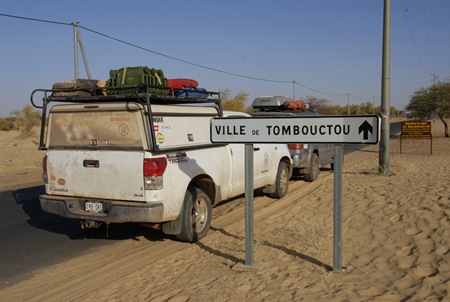
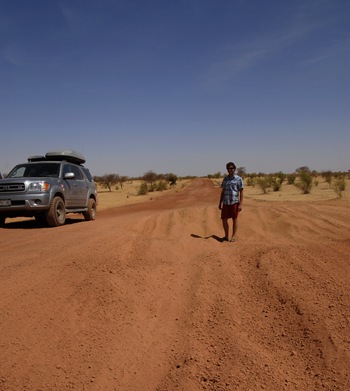
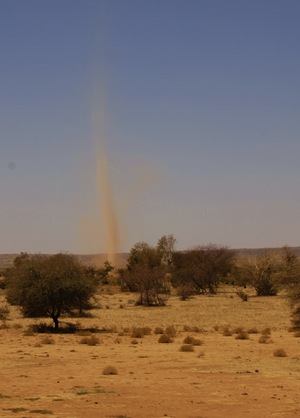
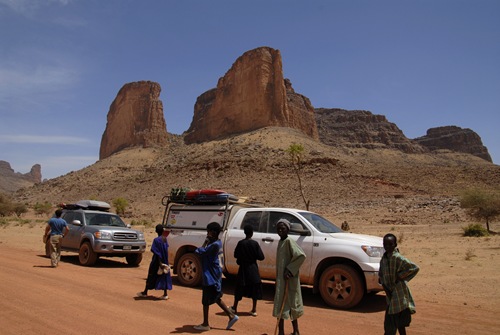
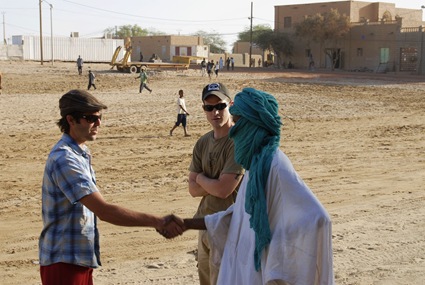
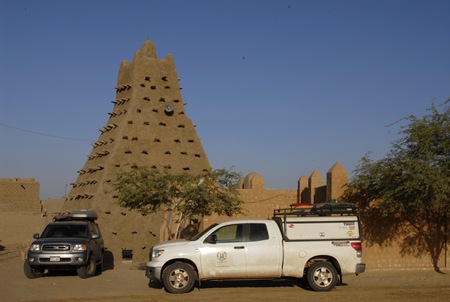
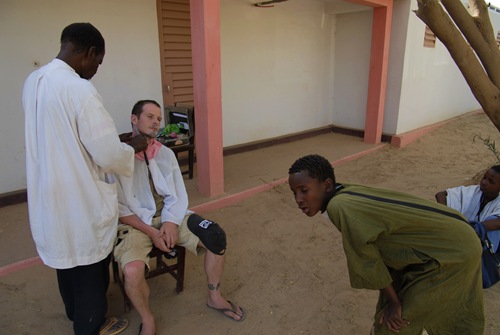
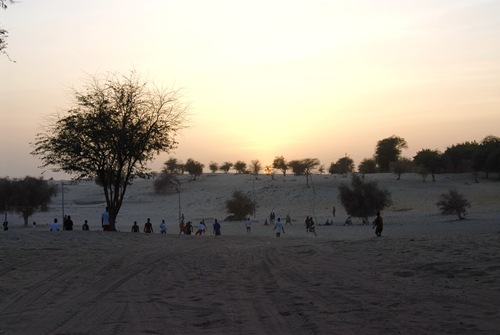
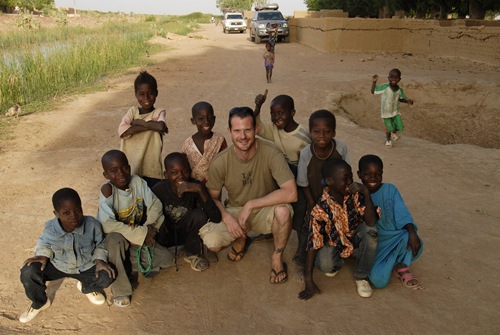
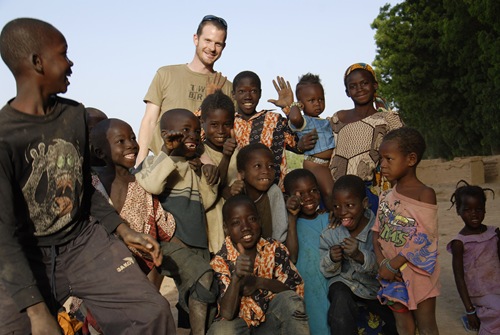
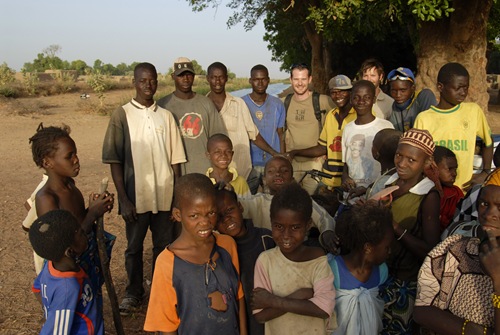
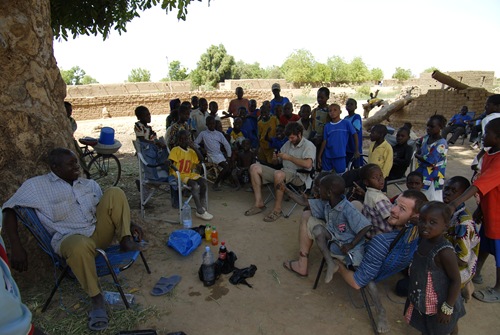
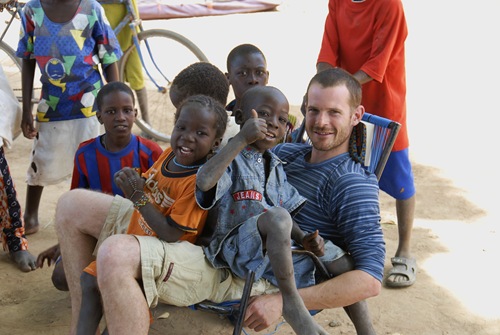
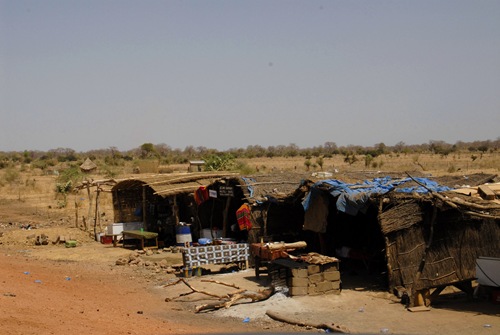
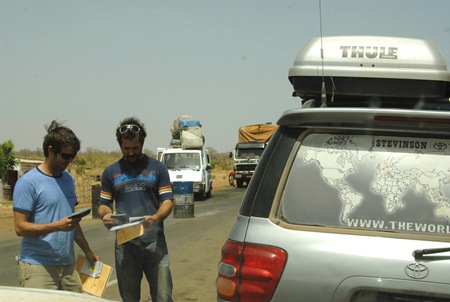
 When picturing a national park, most of us probably think of rangers that help to protect the wildlife and answer visitors questions about the surrounding area and the flora and fauna that reside there. As you get farther and farther from the main tourist tracks in the world, the standard and definition of national parks changes dramatically.
When picturing a national park, most of us probably think of rangers that help to protect the wildlife and answer visitors questions about the surrounding area and the flora and fauna that reside there. As you get farther and farther from the main tourist tracks in the world, the standard and definition of national parks changes dramatically.
